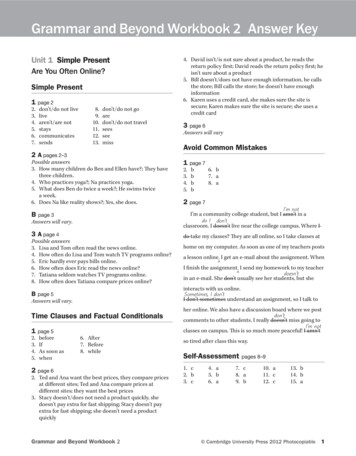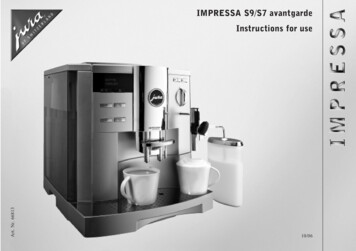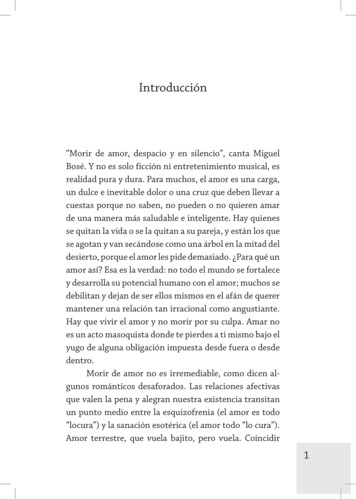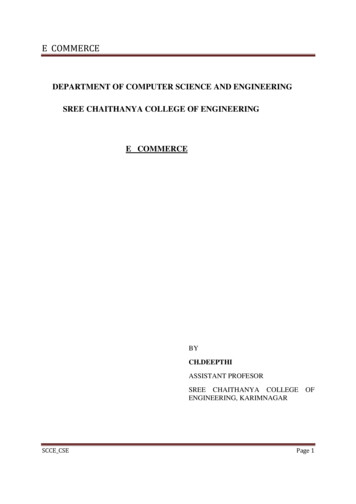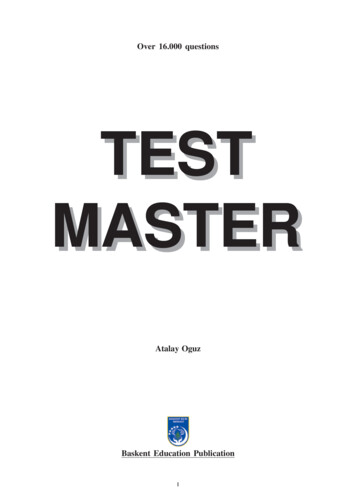
Transcription
NEVER LET ME GOKAZUO ISHIGURO
KAZUO ISHIGUROPART ONE
NEVER LET ME GOCHAPTER ONEMy name is Kathy H. I’m thirty-one years old, and I’ve beena carer now for over eleven years. That sounds long enough, Iknow, but actually they want me to go on for another eightmonths, until the end of this year. That’ll make it almost exactlytwelve years. Now I know my being a carer so long isn’tnecessarily because they think I’m fantastic at what I do. There aresome really good carers who’ve been told to stop after just two orthree years. And I can think of one carer at least who went on forall of fourteen years despite being a complete waste of space. SoI’m not trying to boast. But then I do know for a fact they’ve beenpleased with my work, and by and large, I have too. My donorshave always tended to do much better than expected. Their
KAZUO ISHIGUROrecovery times have been impressive, and hardly any of them havebeen classified as “agitated,” even before fourth donation. Okay,maybe I am boasting now. But it means a lot to me, being able todo my work well, especially that bit about my donors staying“calm.” I’ve developed a kind of instinct around donors. I knowwhen to hang around and comfort them, when to leave them tothemselves; when to listen to everything they have to say, andwhen just to shrug and tell them to snap out of it.Anyway, I’m not making any big claims for myself. I knowcarers, working now, who are just as good and don’t get half thecredit. If you’re one of them, I can understand how you might getresentful—about my bedsit, my car, above all, the way I get topick and choose who I look after. And I’m a Hailsham student—which is enough by itself sometimes to get people’s backs up.Kathy H., they say, she gets to pick and choose, and she alwayschooses her own kind: people from Hailsham, or one of the otherprivileged estates. No wonder she has a great record. I’ve heard itsaid enough, so I’m sure you’ve heard it plenty more, and maybethere’s something in it. But I’m not the first to be allowed to pickand choose, and I doubt if I’ll be the last. And anyway, I’ve donemy share of looking after donors brought up in every kind of
NEVER LET ME GOplace. By the time I finish, remember, I’ll have done twelve yearsof this, and it’s only for the last six they’ve let me choose.And why shouldn’t they? Carers aren’t machines. You tryand do your best for every donor, but in the end, it wears youdown. You don’t have unlimited patience and energy. So whenyou get a chance to choose, of course, you choose your own kind.That’s natural. There’s no way I could have gone on for as long asI have if I’d stopped feeling for my donors every step of the way.And anyway, if I’d never started choosing, how would I ever havegot close again to Ruth and Tommy after all those years?But these days, of course, there are fewer and fewer donorsleft who I remember, and so in practice, I haven’t been choosingthat much. As I say, the work gets a lot harder when you don’thave that deeper link with the donor, and though I’ll miss being acarer, it feels just about right to be finishing at last come the endof the year.Ruth, incidentally, was only the third or fourth donor I got tochoose. She already had a carer assigned to her at the time, and Iremember it taking a bit of nerve on my part. But in the end Imanaged it, and the instant I saw her again, at that recovery centrein Dover, all our differences—while they didn’t exactly vanish—
KAZUO ISHIGUROseemed not nearly as important as all the other things: like the factthat we’d grown up together at Hailsham, the fact that we knewand remembered things no one else did. It’s ever since then, Isuppose, I started seeking out for my donors people from the past,and whenever I could, people from Hailsham.There have been times over the years when I’ve tried to leaveHailsham behind, when I’ve told myself I shouldn’t look back somuch. But then there came a point when I just stopped resisting. Ithad to do with this particular donor I had once, in my third year asa carer; it was his reaction when I mentioned I was fromHailsham. He’d just come through his third donation, it hadn’tgone well, and he must have known he wasn’t going to make it.He could hardly breathe, but he looked towards me and said:“Hailsham. I bet that was a beautiful place.” Then the nextmorning, when I was making conversation to keep his mind off itall, and I asked where he’d grown up, he mentioned some place inDorset and his face beneath the blotches went into a completelynew kind of grimace. And I realised then how desperately hedidn’t want reminded. Instead, he wanted to hear about Hailsham.So over the next five or six days, I told him whatever hewanted to know, and he’d lie there, all hooked up, a gentle smile
NEVER LET ME GObreaking through. He’d ask me about the big things and the littlethings. About our guardians, about how we each had our owncollection chests under our beds, the football, the rounders, thelittle path that took you all round the outside of the main house,round all its nooks and crannies, the duck pond, the food, the viewfrom the Art Room over the fields on a foggy morning.Sometimes he’d make me say things over and over; things I’d toldhim only the day before, he’d ask about like I’d never told him.“Did you have a sports pavilion?” “Which guardian was yourspecial favourite?” At first I thought this was just the drugs, butthen I realised his mind was clear enough. What he wanted wasnot just to hear about Hailsham, but to remember Hailsham, justlike it had been his own childhood. He knew he was close tocompleting and so that’s what he was doing: getting me todescribe things to him, so they’d really sink in, so that maybeduring those sleepless nights, with the drugs and the pain and theexhaustion, the line would blur between what were my memoriesand what were his. That was when I first understood, reallyunderstood, just how lucky we’d been—Tommy, Ruth, me, all therest of us.
KAZUO ISHIGURODRIVING AROUND THE COUNTRY NOW, I still seethings that will remind me of Hailsham. I might pass the corner ofa misty field, or see part of a large house in the distance as I comedown the side of a valley, even a particular arrangement of poplartrees up on a hillside, and I’ll think: “Maybe that’s it! I’ve foundit! This actually is Hailsham!” Then I see it’s impossible and I goon driving, my thoughts drifting on elsewhere. In particular, thereare those pavilions. I spot them all over the country, standing onthe far side of playing fields, little white prefab buildings with arow of windows unnaturally high up, tucked almost under theeaves. I think they built a whole lot like that in the fifties andsixties, which is probably when ours was put up. If I drive pastone I keep looking over to it for as long as possible, and one dayI’ll crash the car like that, but I keep doing it. Not long ago I wasdriving through an empty stretch of Worcestershire and saw onebeside a cricket ground so like ours at Hailsham I actually turnedthe car and went back for a second look.We loved our sports pavilion, maybe because it reminded usof those sweet little cottages people always had in picture bookswhen we were young. I can remember us back in the Juniors,pleading with guardians to hold the next lesson in the pavilioninstead of the usual room. Then by the time we were in Senior 2—
NEVER LET ME GOwhen we were twelve, going on thirteen—the pavilion hadbecome the place to hide out with your best friends when youwanted to get away from the rest of Hailsham.The pavilion was big enough to take two separate groupswithout them bothering each other—in the summer, a third groupcould hang about out on the veranda. But ideally you and yourfriends wanted the place just to yourselves, so there was oftenjockeying and arguing. The guardians were always telling us to becivilised about it, but in practice, you needed to have some strongpersonalities in your group to stand a chance of getting thepavilion during a break or free period. I wasn’t exactly the wiltingtype myself, but I suppose it was really because of Ruth we got inthere as often as we did.Usually we just spread ourselves around the chairs andbenches—there’d be five of us, six if Jenny B. came along—andhad a good gossip. There was a kind of conversation that couldonly happen when you were hidden away in the pavilion; wemight discuss something that was worrying us, or we might endup screaming with laughter, or in a furious row. Mostly, it was away to unwind for a while with your closest friends.
KAZUO ISHIGUROOn the particular afternoon I’m now thinking of, we werestanding up on stools and benches, crowding around the highwindows. That gave us a clear view of the North Playing Fieldwhere about a dozen boys from our year and Senior 3 hadgathered to play football. There was bright sunshine, but it musthave been raining earlier that day because I can remember how thesun was glinting on the muddy surface of the grass.Someone said we shouldn’t be so obvious about watching,but we hardly moved back at all. Then Ruth said: “He doesn’tsuspect a thing. Look at him. He really doesn’t suspect a thing.”When she said this, I looked at her and searched for signs ofdisapproval about what the boys were going to do to Tommy. Butthe next second Ruth gave a little laugh and said: “The idiot!”And I realised that for Ruth and the others, whatever the boyschose to do was pretty remote from us; whether we approved ornot didn’t come into it. We were gathered around the windows atthat moment not because we relished the prospect of seeingTommy get humiliated yet again, but just because we’d heardabout this latest plot and were vaguely curious to watch it unfold.In those days, I don’t think what the boys did amongst themselves
NEVER LET ME GOwent much deeper than that. For Ruth, for the others, it was thatdetached, and the chances are that’s how it was for me too.Or maybe I’m remembering it wrong. Maybe even then,when I saw Tommy rushing about that field, undisguised delighton his face to be accepted back in the fold again, about to play thegame at which he so excelled, maybe I did feel a little stab of pain.What I do remember is that I noticed Tommy was wearing thelight blue polo shirt he’d got in the Sales the previous month—theone he was so proud of. I remember thinking: “He’s really stupid,playing football in that. It’ll get ruined, then how’s he going tofeel?” Out loud, I said, to no one in particular: “Tommy’s got hisshirt on. His favourite polo shirt.”I don’t think anyone heard me, because they were alllaughing at Laura—the big clown in our group—mimicking oneafter the other the expressions that appeared on Tommy’s face ashe ran, waved, called, tackled. The other boys were all movingaround the field in that deliberately languorous way they havewhen they’re warming up, but Tommy, in his excitement, seemedalready to be going full pelt. I said, louder this time: “He’s goingto be so sick if he ruins that shirt.” This time Ruth heard me, but
KAZUO ISHIGUROshe must have thought I’d meant it as some kind of joke, becauseshe laughed half-heartedly, then made some quip of her own.Then the boys had stopped kicking the ball about, and werestanding in a pack in the mud, their chests gently rising and fallingas they waited for the team picking to start. The two captains whoemerged were from Senior 3, though everyone knew Tommy wasa better player than any of that year. They tossed for first pick,then the one who’d won stared at the group.“Look at him,” someone behind me said. “He’s completelyconvinced he’s going to be first pick. Just look at him!”There was something comical about Tommy at that moment,something that made you think, well, yes, if he’s going to be thatdaft, he deserves what’s coming. The other boys were allpretending to ignore the picking process, pretending they didn’tcare where they came in the order. Some were talking quietly toeach other, some re-tying their laces, others just staring down attheir feet as they trammelled the mud. But Tommy was lookingeagerly at the Senior 3 boy, as though his name had already beencalled.Laura kept up her performance all through the team-picking,doing all the different expressions that went across Tommy’s face:
NEVER LET ME GOthe bright eager one at the start; the puzzled concern when fourpicks had gone by and he still hadn’t been chosen; the hurt andpanic as it began to dawn on him what was really going on. Ididn’t keep glancing round at Laura, though, because I waswatching Tommy; I only knew what she was doing because theothers kept laughing and egging her on. Then when Tommy wasleft standing alone, and the boys all began sniggering, I heardRuth say:“It’s coming. Hold it. Seven seconds. Seven, six, five . . .”She never got there. Tommy burst into thunderous bellowing,and the boys, now laughing openly, started to run off towards theSouth Playing Field. Tommy took a few strides after them—it washard to say whether his instinct was to give angry chase or if hewas panicked at being left behind. In any case he soon stoppedand stood there, glaring after them, his face scarlet. Then he beganto scream and shout, a nonsensical jumble of swear words andinsults.We’d all seen plenty of Tommy’s tantrums by then, so wecame down off our stools and spread ourselves around the room.We tried to start up a conversation about something else, but therewas Tommy going on and on in the background, and although at
KAZUO ISHIGUROfirst we just rolled our eyes and tried to ignore it, in the end—probably a full ten minutes after we’d first moved away—we wereback up at the windows again.The other boys were now completely out of view, andTommy was no longer trying to direct his comments in anyparticular direction. He was just raving, flinging his limbs about,at the sky, at the wind, at the nearest fence post. Laura said he wasmaybe “rehearsing his Shakespeare.” Someone else pointed outhow each time he screamed something he’d raise one foot off theground, pointing it outwards, “like a dog doing a pee.” Actually,I’d noticed the same foot movement myself, but what had struckme was that each time he stamped the foot back down again,flecks of mud flew up around his shins. I thought again about hisprecious shirt, but he was too far away for me to see if he’d gotmuch mud on it.“I suppose it is a bit cruel,” Ruth said, “the way they alwayswork him up like that. But it’s his own fault. If he learnt to keephis cool, they’d leave him alone.”“They’d still keep on at him,” Hannah said. “Graham K.’stemper’s just as bad, but that only makes them all the more careful
NEVER LET ME GOwith him. The reason they go for Tommy’s because he’s alayabout.”Then everyone was talking at once, about how Tommy nevereven tried to be creative, about how he hadn’t even put anything infor the Spring Exchange. I suppose the truth was, by that stage,each of us was secretly wishing a guardian would come from thehouse and take him away. And although we hadn’t had any part inthis latest plan to rile Tommy, we had taken out ringside seats,and we were starting to feel guilty. But there was no sign of aguardian, so we just kept swapping reasons why Tommy deservedeverything he got. Then when Ruth looked at her watch and saideven though we still had time, we should get back to the mainhouse, nobody argued.Tommy was still going strong as we came out of the pavilion.The house was over to our left, and since Tommy was standing inthe field straight ahead of us, there was no need to go anywherenear him. In any case, he was facing the other way and didn’tseem to register us at all. All the same, as my friends set off alongthe edge of the field, I started to drift over towards him. I knewthis would puzzle the others, but I kept going—even when I heardRuth’s urgent whisper to me to come back.
KAZUO ISHIGUROI suppose Tommy wasn’t used to being disturbed during hisrages, because his first response when I came up to him was tostare at me for a second, then carry on as before. It was like hewas doing Shakespeare and I’d come up onto the stage in themiddle of his performance. Even when I said: “Tommy, your niceshirt. You’ll get it all messed up,” there was no sign of him havingheard me.So I reached forward and put a hand on his arm. Afterwards,the others thought he’d meant to do it, but I was pretty sure it wasunintentional. His arms were still flailing about, and he wasn’t toknow I was about to put out my hand. Anyway, as he threw up hisarm, he knocked my hand aside and hit the side of my face. Itdidn’t hurt at all, but I let out a gasp, and so did most of the girlsbehind me.That’s when at last Tommy seemed to become aware of me,of the others, of himself, of the fact that he was there in that field,behaving the way he had been, and stared at me a bit stupidly.“Tommy,” I said, quite sternly. “There’s mud all over yourshirt.”“So what?” he mumbled. But even as he said this, he lookeddown and noticed the brown specks, and only just stopped himself
NEVER LET ME GOcrying out in alarm. Then I saw the surprise register on his facethat I should know about his feelings for the polo shirt.“It’s nothing to worry about,” I said, before the silence gothumiliating for him. “It’ll come off. If you can’t get it off yourself,just take it to Miss Jody.”He went on examining his shirt, then said grumpily: “It’snothing to do with you anyway.”He seemed to regret immediately this last remark and lookedat me sheepishly, as though expecting me to say somethingcomforting back to him. But I’d had enough of him by now,particularly with the girls watching—and for all I knew, anynumber of others from the windows of the main house. So I turnedaway with a shrug and rejoined my friends.Ruth put an arm around my shoulders as we walked away.“At least you got him to pipe down,” she said. “Are you okay?Mad animal.”
KAZUO ISHIGUROCHAPTER TWOThis was all a long time ago so I might have some of itwrong; but my memory of it is that my approaching Tommy thatafternoon was part of a phase I was going through around thattime—something to do with compulsively setting myselfchallenges—and I’d more or less forgotten all about it whenTommy stopped me a few days later.I don’t know how it was where you were, but at Hailsham wehad to have some form of medical almost every week—usually upin Room 18 at the very top of the house—with stern Nurse Trisha,or Crow Face, as we called her. That sunny morning a crowd of uswas going up the central staircase to be examined by her, whileanother lot she’d just finished with was on its way down. So the
NEVER LET ME GOstairwell was filled with echoing noise, and I was climbing thesteps head down, just following the heels of the person in front,when a voice near me went: “Kath!”Tommy, who was in the stream coming down, had stoppeddead on the stairs with a big open smile that immediately irritatedme. A few years earlier maybe, if we ran into someone we werepleased to see, we’d put on that sort of look. But we were thirteenby then, and this was a boy running into a girl in a really publicsituation. I felt like saying: “Tommy, why don’t you grow up?”But I stopped myself, and said instead: “Tommy, you’re holdingeveryone up. And so am I.”He glanced upwards and sure enough the flight above wasalready grinding to a halt. For a second he looked panicked, thenhe squeezed himself right into the wall next to me, so it was justabout possible for people to push past. Then he said:“Kath, I’ve been looking all over for you. I meant to saysorry. I mean, I’m really, really sorry. I honestly didn’t mean to hityou the other day. I wouldn’t dream of hitting a girl, and even if Idid, I’d never want to hit you. I’m really, really sorry.”
KAZUO ISHIGURO“It’s okay. An accident, that’s all.” I gave him a nod andmade to move away. But Tommy said brightly:“The shirt’s all right now. It all washed out.”“That’s good.”“It didn’t hurt, did it? When I hit you?”“Sure. Fractured skull. Concussion, the lot. Even Crow Facemight notice it. That’s if I ever get up there.”“But seriously, Kath. No hard feelings, right? I’m awfullysorry. I am, honestly.”At last I gave him a smile and said with no irony: “Look,Tommy, it was an accident and it’s now one hundred percentforgotten. I don’t hold it against you one tiny bit.”He still looked unsure, but now some older students werepushing behind him, telling him to move. He gave me a quicksmile and patted my shoulder, like he might do to a younger boy,and pushed his way into the flow. Then, as I began to climb, Iheard him shout from below: “See you, Kath!”I’d found the whole thing mildly embarrassing, but it didn’tlead to any teasing or gossip; and I must admit, if it hadn’t been
NEVER LET ME GOfor that encounter on the stairs, I probably wouldn’t have taken theinterest I did in Tommy’s problems over the next several weeks.I saw a few of the incidents myself. But mostly I heard aboutthem, and when I did, I quizzed people until I’d got a more or lessfull account. There were more temper tantrums, like the timeTommy was supposed to have heaved over two desks in Room 14,spilling all the contents on the floor, while the rest of the class,having escaped onto the landing, barricaded the door to stop himcoming out. There was the time Mr. Christopher had had to pinback his arms to stop him attacking Reggie D. during footballpractice. Everyone could see, too, when the Senior 2 boys went ontheir fields run, Tommy was the only one without a runningpartner. He was a good runner, and would quickly open up ten,fifteen yards between him and the rest, maybe thinking this woulddisguise the fact that no one wanted to run with him. Then therewere rumours almost every day of pranks that had been played onhim. A lot of these were the usual stuff—weird things in his bed, aworm in his cereal—but some of it sounded pointlessly nasty: likethe time someone cleaned a toilet with his toothbrush so it waswaiting for him with shit all over the bristles. His size andstrength—and I suppose that temper—meant no one tried actualphysical bullying, but from what I remember, for a couple of
KAZUO ISHIGUROmonths at least, these incidents kept coming. I thought sooner orlater someone would start saying it had gone too far, but it justkept on, and no one said anything.I tried to bring it up once myself, in the dorm after lights-out.In the Seniors, we were down to six per dorm, so it was just ourlittle group, and we often had our most intimate conversationslying in the dark before we fell asleep. You could talk about thingsthere you wouldn’t dream of talking about any other place, noteven in the pavilion. So one night I brought up Tommy. I didn’tsay much; I just summed up what had been happening to him andsaid it wasn’t really very fair. When I’d finished, there was afunny sort of silence hanging in the dark, and I realised everyonewas waiting for Ruth’s response—which was usually whathappened whenever something a bit awkward came up. I keptwaiting, then I heard a sigh from Ruth’s side of the room, and shesaid:“You’ve got a point, Kathy. It’s not nice. But if he wants it tostop, he’s got to change his own attitude. He didn’t have a thingfor the Spring Exchange. And has he got anything for next month?I bet he hasn’t.”
NEVER LET ME GOI should explain a bit here about the Exchanges we had atHailsham. Four times a year—spring, summer, autumn, winter—we had a kind of big exhibition-cum-sale of all the things we’dbeen creating in the three months since the last Exchange.Paintings, drawings, pottery; all sorts of “sculptures” made fromwhatever was the craze of the day—bashed-up cans, maybe, orbottle tops stuck onto cardboard. For each thing you put in, youwere paid in Exchange Tokens—the guardians decided how manyyour particular masterpiece merited—and then on the day of theExchange you went along with your tokens and “bought” the stuffyou liked. The rule was you could only buy work done by studentsin your own year, but that still gave us plenty to choose from,since most of us could get pretty prolific over a three-monthperiod.Looking back now, I can see why the Exchanges became soimportant to us. For a start, they were our only means, aside fromthe Sales—the Sales were something else, which I’ll come tolater—of building up a collection of personal possessions. If, say,you wanted to decorate the walls around your bed, or wantedsomething to carry around in your bag and place on your deskfrom room to room, then you could find it at the Exchange. I cansee now, too, how the Exchanges had a more subtle effect on us
KAZUO ISHIGUROall. If you think about it, being dependent on each other to producethe stuff that might become your private treasures—that’s boundto do things to your relationships. The Tommy business wastypical. A lot of the time, how you were regarded at Hailsham,how much you were liked and respected, had to do with how goodyou were at “creating.”Ruth and I often found ourselves remembering these things afew years ago, when I was caring for her down at the recoverycentre in Dover.“It’s all part of what made Hailsham so special,” she saidonce. “The way we were encouraged to value each other’s work.”“True,” I said. “But sometimes, when I think about the Exchanges now, a lot of it seems a bit odd. The poetry, for instance. Iremember we were allowed to hand in poems, instead of adrawing or a painting. And the strange thing was, we all thoughtthat was fine, we thought that made sense.”“Why shouldn’t it? Poetry’s important.”“But we’re talking about nine-year-old stuff, funny littlelines, all misspelt, in exercise books. We’d spend our precioustokens on an exercise book full of that stuff rather than on
NEVER LET ME GOsomething really nice for around our beds. If we were so keen on aperson’s poetry, why didn’t we just borrow it and copy it downourselves any old afternoon? But you remember how it was. AnExchange would come along and we’d be standing there tornbetween Susie K.’s poems and those giraffes Jackie used tomake.”“Jackie’s giraffes,” Ruth said with a laugh. “They were sobeautiful. I used to have one.”We were having this conversation on a fine summer evening,sitting out on the little balcony of her recovery room. It was a fewmonths after her first donation, and now she was over the worst ofit, I’d always time my evening visits so that we’d be able to spenda half hour or so out there, watching the sun go down over therooftops. You could see lots of aerials and satellite dishes, andsometimes, right over in the distance, a glistening line that was thesea. I’d bring mineral water and biscuits, and we’d sit there talkingabout anything that came into our heads. The centre Ruth was inthat time, it’s one of my favourites, and I wouldn’t mind at all ifthat’s where I ended up. The recovery rooms are small, but they’rewell-designed and comfortable. Everything—the walls, thefloor—has been done in gleaming white tiles, which the centre
KAZUO ISHIGUROkeeps so clean when you first go in it’s almost like entering a hallof mirrors. Of course, you don’t exactly see yourself reflectedback loads of times, but you almost think you do. When you lift anarm, or when someone sits up in bed, you can feel this pale,shadowy movement all around you in the tiles. Anyway, Ruth’sroom at that centre, it also had these big glass sliding panels, soshe could easily see the outside from her bed. Even with her headon the pillow she’d see a big lot of sky, and if it was warmenough, she could get all the fresh air she wanted by stepping outonto the balcony. I loved visiting her there, loved thosemeandering talks we had, through the summer to the early autumn,sitting on that balcony together, talking about Hailsham, theCottages, whatever else drifted into our thoughts.“What I’m saying,” I went on, “is that when we were thatage, when we were eleven, say, we really weren’t interested ineach other’s poems at all. But remember, someone like Christy?Christy had this great reputation for poetry, and we all looked upto her for it. Even you, Ruth, you didn’t dare boss Christy around.All because we thought she was great at poetry. But we didn’tknow a thing about poetry. We didn’t care about it. It’s strange.”
NEVER LET ME GOBut Ruth didn’t get my point—or maybe she was deliberatelyavoiding it. Maybe she was determined to remember us all asmore sophisticated than we were. Or maybe she could sense wheremy talk was leading, and didn’t want us to go that way. Anyway,she let out a long sigh and said:“We all thought Christy’s poems were so good. But I wonderhow they’d look to us now. I wish we had some here, I’d love tosee what we’d think.” Then she laughed and said: “I have still gotsome poems by Peter B. But that was much later, when we were inSenior 4. I must have fancied him. I can’t think why else I’d havebought his poems. They’re just hysterically daft. Takes himself soseriously. But Christy, she was good, I remember she was. It’sfunny, she went right off poems when she started her painting.And she was nowhere near as good at that.”But let me get back to Tommy. What Ruth said that time inour dorm after lights-out, about how Tommy had brought all hisproblems on himself, probably summed up what most people atHailsham thought at that time. But it was when she said what shedid that it occurred to me, as I lay there, that this whole notion ofhis deliberately not trying was one that had been doing the roundsfrom as far back as the Juniors. And it came home to me, with a
KAZUO ISHIGUROkind of chill, that Tommy had been going through what he’d beengoing through not just for weeks or months, but for years.Tommy and I talked about all this not so long ago, and hisown account of how his troubles began confirmed what I wasthinking that night. According to him, it had all started oneafternoon in one of Miss Geraldine’s art classes. Until that day,Tommy told me, he’d always quite enjoyed painting. But
NEVER LET ME GO place. By the time I finish, remember, I’ll have done twelve years of this, and it’s only for the last six they’ve let me choose. And why shouldn’t they? Carers aren’t machines. You try and do your best for every donor, but in the end, it wears you down. You
